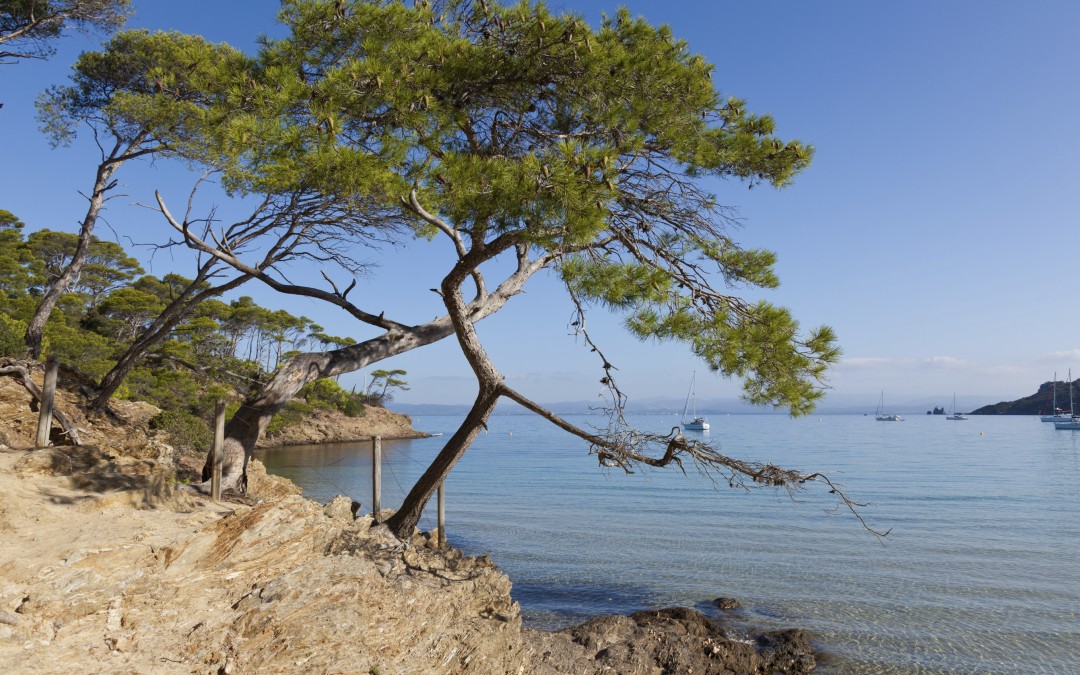Dazzled by the Paradise Isle of Porquerolles

May 22, 2017
A century ago, François-Joseph Fournier, an enterprising 55-year-old Belgian adventurer who struck it rich in the gold mines of Mexico, decided to purchase the perfect wedding present for his young bride, Sylvia.
By chance, he’d learned that there was a Mediterranean island for sale, just eight miles from the southern French coast near Hyères. After paying one million one hundred francs, the pine-forested slab of rock called Porquerolles was all theirs. Before long, Fournier turned it into a thriving agricultural Eden.
Surprisingly enough, the breath taking cliffs, dazzling crystalline coves and powdery sand beaches of Porquerolles have escaped the grasp of high rise luxury resorts and voracious real-estate tycoons. It might be the Côte d’Azur’s wild frontier – a tangle of untamed subtropical landscapes, far from traffic snarls and overdevelopment. Its name is of uncertain origin – possibly Port Cayrola, “port of lavender” in old Provençal, or Port Quairoles, “port of rocks” in even older Celtic. But those who know the island won’t hesitate for a moment to call it paradise.
At nearly five square miles, Porquerolles is the largest and westernmost of the three Hyères Islands, sometimes called Les Iles d’Or, the Golden Islands, probably because of the gold reflections of their mica shale rocks in certain lights. The small central island, the Ile de Port-Cros, is a nature and marine preserve; neither cars nor bicycles are permitted, but hikers and snorkelers are welcome. The eastern Ile du Levant is host to a military base and several private nudist beaches.
Only a short sail from La Tour Fondue at the tip of Hyères, Porquerolles is only a few miles in length and width. Yet, even in peak season, there are inlets on the far side of the island where you can picnic in total privacy. Above all, Porquerolles’s marine wildlife reserve is government protected by strictly enforced rules, as are the countless botanical trails lined with live oaks, olive trees and windswept parasol pines. Cars, camping and smoking (except in the village) are banned. Given the limited number of hotels there’s a distinctive luxury about staying the night, once day trippers have taken the last, early-evening ferry to the mainland.
Come sunset, everyone converges on the dusty village square, near the ochre church, where a few local residents are finishing their game of pétanque. The cicadas, as if spurred by the metallic clicking of the boules, are thrumming at an almost deafening level. Then, suddenly, all is silent. As the light fades, the palm trees go black against the fairy tale pink and mauve sky.
Don’t miss the sacred island ritual—aperitif time in the village, when the bronzed and freshly showered Porquerollais head for L’Escale, the corner bar on the square and the island’s oldest establishment, a favourite haunt of local yachtsmen and the visiting beau monde.
Visitors come to these islands to hide out, not to be seen or to party. They get around on the popular ubiquitous bikes, which can be rented fully equipped with toddler seats and carts.
Minutes away by bike is one of the loveliest beaches on the island, a curved stretch of white sand surrounded by wind-twisted pines, but be sure to bring your own picnic, easily improvised after a stop at the excellent village bakery, tiny grocery and fruit stand. Among the most splendiferous spots for hiking is the rugged Gorge du Loup, on the southwest coast, and the easternmost beach, La Galère, protected from the mistral wind.
For wine-tasting on the vineyard premises, take a bike ride across the inland paths to the Domaine de l’Ile, the original Fournier vineyard, now run by grandson Sébastien Le Ber, whose delicious fruity rosé, nicely chilled, is the quintessential island beverage. The organically grown grapes are handpicked, and the production is only about 150,000 bottles a year. “There’s something inexplicable about the conditions here,” says Le Ber, “the cool nights, the dampness, the quality of the soil and the sunshine, that makes Porquerolles wine unique.”
Richard Reeves is the founder of Essential Sailing and if you have been inspired to relax on a luxury sailing holiday, why not make this idyllic world your reality.
 Sign up to download your Free Holiday Destination Guide, and receive our exclusive offers too!
Sign up to download your Free Holiday Destination Guide, and receive our exclusive offers too!
